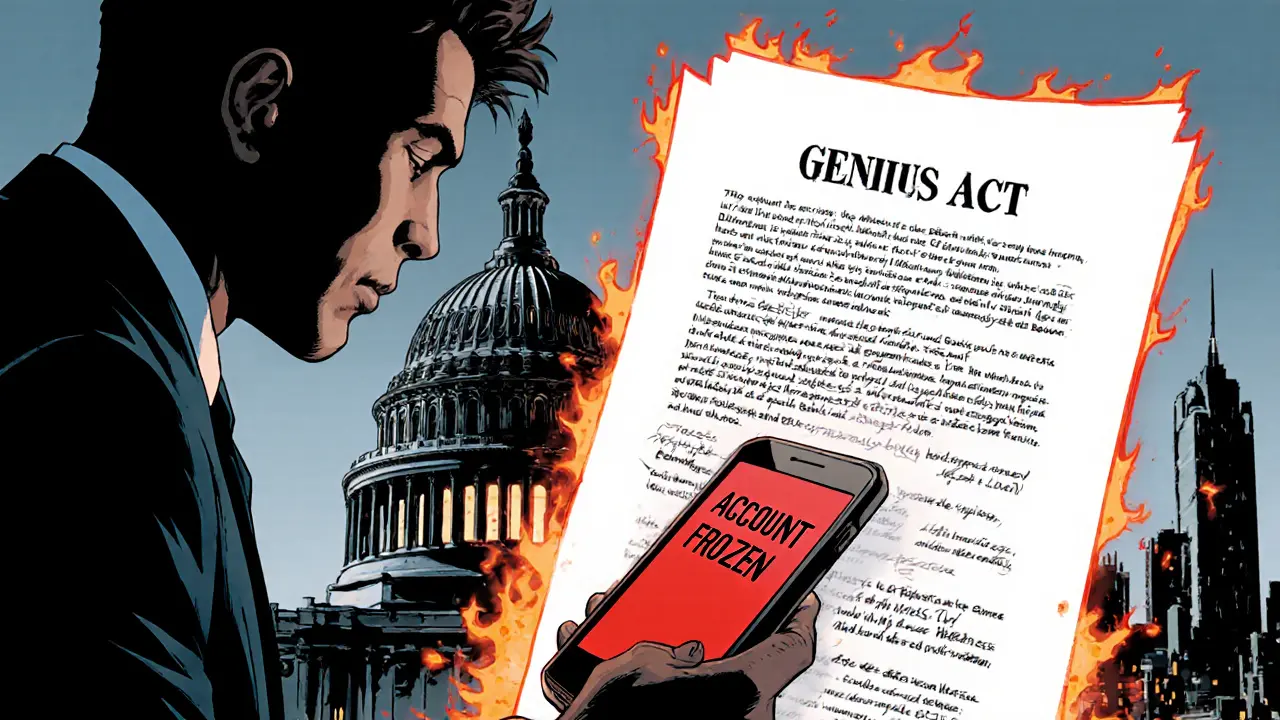Why Your Bank May Freeze Crypto Transactions and How to Respond
Learn why banks freeze crypto accounts under the 2025 GENIUS Act, how freezes happen, steps to resolve them, and tips to avoid future blocks.
Continue ReadingWhen dealing with Crypto Account Freeze, a temporary lock placed by an exchange, regulator, or court that stops you from sending, receiving, or trading your digital assets. Also known as account lock, it usually follows a compliance flag, a security alert, or a legal order. Crypto account freeze is not a myth; it’s a real tool that protects markets and enforces rules. KYC Verification, the process of confirming a user’s identity to meet anti‑money‑laundering regulations often triggers a freeze when documentation is missing or inconsistent. Likewise, Regulatory Compliance, adherence to laws such as AML, CFT, and tax reporting that govern crypto activities can compel exchanges to lock accounts until the issue is resolved. In short, a crypto account freeze is a safety net that activates when the system detects potential risk.
Why does a freeze happen? The most common cause is a red flag during KYC checks—maybe the user’s ID didn’t match the provided selfie or the source‑of‑funds documents were vague. Exchange Security, the suite of technical and procedural safeguards an exchange uses to protect user funds and data also relies on freezes to stop suspicious withdrawals after a hack warning. Another trigger is a legal injunction; courts can order a freeze to preserve assets during an investigation. These scenarios illustrate three semantic triples: (1) Crypto account freeze encompasses regulatory compliance actions, (2) KYC verification influences crypto account freeze decisions, and (3) Exchange security measures require crypto account freeze as a risk‑mitigation tool.
If you see a freeze notice, the first step is to read the message carefully. Exchanges usually explain whether the lock is due to missing KYC paperwork, a security concern, or a legal request. Contact support through the official channel—never reply to unsolicited emails. Provide the requested documents promptly; a clear photo of your ID, proof of address, and a source‑of‑funds statement often clear the hurdle. While you’re waiting, avoid making new trades or withdrawals, because extra activity can extend the freeze. Keep a record of all communications; this helps if you need to appeal to a regulator or tribunal later.
Prevention works better than cure. Regularly update your KYC profile, especially after a name change or relocation. Enable two‑factor authentication (2FA) and consider hardware‑based security keys for extra protection. Monitor exchange announcements for policy changes—some platforms tighten rules after a major hack, which can lead to a wave of freezes. Finally, diversify where you keep your crypto. A hardware wallet gives you full control and stays out of the exchange’s freeze scope, while a small portion on a reputable exchange ensures liquidity.
Understanding the broader landscape helps you anticipate freezes. In jurisdictions with strict AML laws, regulators frequently audit exchanges, causing batch freezes of accounts with incomplete data. Conversely, regions with lax oversight may experience fewer freezes but higher fraud risk. Knowing how your local laws interact with exchange policies can guide you in choosing the right platform. For instance, a trader in the EU might favor an exchange that complies with the Fifth Anti‑Money‑Laundering Directive, reducing the chance of unexpected freezes.
Lastly, remember that a freeze is often a temporary measure. Once you satisfy the compliance or security requirement, the exchange typically restores full access within days. Some platforms even offer a “self‑service” portal where you can upload documents and track the status of your freeze in real time. This transparency turns a stressful event into a manageable checklist.
Below you’ll find a curated selection of articles that dive deeper into each aspect of crypto account freezes—whether you’re looking for detailed legal analysis, step‑by‑step guides for unfreezing, or strategies to keep your assets safe across multiple platforms. Use them to build a solid defense against future freezes and stay in control of your digital wealth.

Learn why banks freeze crypto accounts under the 2025 GENIUS Act, how freezes happen, steps to resolve them, and tips to avoid future blocks.
Continue Reading